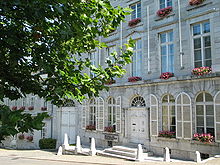- Parliament of the German-speaking Community
-
Parliament of the
German-speaking Community
Parlament der
Deutschsprachigen GemeinschaftType Type Unicameral Leadership Speaker Ludwig Siquet, SP
since 6 July 2004Members 25 Political groups CSP (7), SP (5), PFF (4),
ProDG (4), Ecolo (3), Vivant (2)Elections Last election June 7, 2009 Meeting place 
Kaperberg, Eupen Website http://www.dgparlament.be/ The Parliament of the German-speaking Community (German: Parlament der Deutschsprachigen Gemeinschaft or PDG) is the legislative assembly of the German-speaking Community of Belgium based in Eupen.
The most important tasks of the Parliament of the German-speaking Community include the election and the supervision of the Government of the German-speaking Community, the adoption of decrees for the German-speaking Community and the preparation and adoption of the annual budget.
Contents
Members and elections
The Parliament of the German-speaking Community has 25 members who are directly elected every 5 years, together with the elections for the European Parliament. These members are the only members who have the right to speak and to vote. In addition, there are also a number of members with a consultative vote who not actual members of the Parliament, but do have the right to attend and participate in its meetings.
The advisory members are the Provincial Councillors of Liège, the members of the Walloon Parliament, the members of the Chamber of Representatives and the members of the Senate who reside in the German-speaking area of Belgium and have taken the oath of office in German, as well as the Member of the European Parliament elected by the German-speaking electoral college.
History
Since October 1973 the German-speaking Community has its own parliament, which was at that time known as the Council of the German Cultural Community (German: Rat der deutschen Kulturgemeinschaft). In 1973, the members were not directly elected, but the distribution of seats was determined by the election results for the national Parliament. However, in March 1974, the first direct elections for the Council of the German Cultural Community took place. The name of the parliament was changed to Council of the German-speaking Community (German: Rat der Deutschsprachigen Gemeinschaft) in 1984, and to Parliament of the German-speaking Community in 2004.
Competences
The German-speaking Community has powers over cultural, linguistic and "personal" matters (e.g. education, health care, ...) like the other two communities of Belgium.
The Government of the Walloon Region, with one representative for the German-speaking Community in its Parliament, exercises regional matters over the territory. However, there has been some debate whether the German-speakers should have their own region. As article 139 of the Belgian Constitution specifies, the Walloon Region may transfer some regional powers to the German-speaking Community, which it has done for the following competences:
- In 1995: monuments/patrimony
- In 2000: archaeological excavations and employment
- In 2005: supervision of the church council; supervision of the municipalities and police zones; the financing of the municipalities; funerals and gravestones
However, as opposed to the other two communities, it has no authorisation over the language use in administration, since all municipalities are municipalities with language facilities for French.
Current composition
Following the 2009 regional election, the composition of the Parliament of the German-speaking Community is as follows:
Affiliation Members Christian Social Party (CSP) 7 Socialist Party (SP) 5 Party for Freedom and Progress (PFF) 4 ProDG 4 Ecolo 3 Vivant 2 Total 25 The Socialist Party, the liberal Party for Freedom and Progress and the regionalist ProDG signed an agreement on 10 June to form the next Government of the German-speaking Community. It is the first time in the history of the German-speaking Community that an outgoing government coalition succeeds itself.[1] Under the terms of the agreement, Karl-Heinz Lambertz (SP) will remain Minister-President and Berni Collas (PFF) will stay on as Community senator until January 2010, at which point he will be replaced by a socialist.[2]
Committees
The Parliament of the German-speaking Community currently has 5 committees:
- Committee I on General Policy, Local Government, Petitions, Finances and Cooperation
- Committee II on Culture
- Committee III on Education and Training
- Committee IV on Health, Employment and Social Affairs
- Oversight Committee on Electoral Expenditure and Communications of the Public Authorities of the German-speaking Community
References
- ^ "Coalition accord in German-speaking Belgium". Flandersnews.be. 2009-06-12. http://www.deredactie.be/cm/vrtnieuws.english/news/090612_German_coalition. Retrieved 2009-06-15.[dead link]
- ^ "Duitstalige coalitiepartners ondertekenen regeerakkoord" (in Dutch). De Standaard Online. 2009-06-11. http://www.standaard.be/Artikel/Detail.aspx?artikelId=DMF20090611_019. Retrieved 2009-06-15.
External links
- Parlament der Deutschsprachigen Gemeinschaft — Official site of the Parliament of the German-speaking Community.
- Deutschsprachige Gemeinschaft — Official site of the German-speaking Community.
Governments of Belgium Federal Belgium Government (Prime Ministers) — Parliament consisting of the Chamber of Representatives (representatives) and Senate (senators)
Brussels-Capital Region Brussels Government (Minister-President) — Brussels Parliament (members)Flemish Region and Community
(merged institutions)Walloon Region French Community German-speaking Community Government (Minister-President) — Parliament (members)See also: Politics of Belgium · Political parties in Belgium · Elections in BelgiumCategories:- Parliament of the German-speaking Community
- German-speaking Community of Belgium
- Unicameral legislatures
Wikimedia Foundation. 2010.
